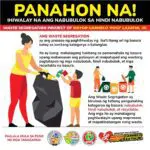 In a bid to address the growing waste management challenges, the city government is calling on residents to prioritize waste segregation in their daily lives. “Panahon na! Ihiwalay na ang nabubulok sa hindi nabubulok,” emphasizes the importance of properly sorting waste to reduce pollution and ensure proper disposal of different types of garbage. Waste segregation plays a crucial role in promoting environmental sustainability and maintaining a cleaner, healthier community.
In a bid to address the growing waste management challenges, the city government is calling on residents to prioritize waste segregation in their daily lives. “Panahon na! Ihiwalay na ang nabubulok sa hindi nabubulok,” emphasizes the importance of properly sorting waste to reduce pollution and ensure proper disposal of different types of garbage. Waste segregation plays a crucial role in promoting environmental sustainability and maintaining a cleaner, healthier community.
Waste segregation is the process of separating waste into categories based on their nature and characteristics. This practice not only ensures that the environment is protected but also makes it easier to recycle materials, compost organic waste, and dispose of non-biodegradable items correctly. It is a critical step in managing waste in an organized and eco-friendly manner.
There are three main categories of waste that need to be segregated: biodegradable, non-biodegradable, and recyclable. Biodegradable waste consists of organic materials such as food scraps, leaves, and other plant-based matter that can be composted. Non-biodegradable waste, on the other hand, includes items that do not decompose easily, such as plastics, metals, and certain chemicals. Lastly, recyclable waste includes paper, cardboard, bottles, and other materials that can be reused or repurposed.
Proper segregation of these types of waste is essential for effective waste processing. Biodegradable waste can be composted and used as fertilizer, non-biodegradable items can be recycled or disposed of responsibly, and recyclable materials can be processed into new products, reducing the need for new raw materials. This not only helps conserve natural resources but also reduces the amount of waste that ends up in landfills and waterways.
The city government is actively promoting waste segregation through various information campaigns, urging residents to follow simple steps such as using separate bins for each category of waste and regularly sorting their garbage at home. Schools, barangays, and local offices are also encouraged to implement waste segregation practices to set a positive example for the entire community.
By adopting waste segregation, the community can significantly reduce the environmental impact of waste disposal. This practice helps decrease pollution, prevents the harmful effects of improper waste disposal, and contributes to a cleaner and greener environment.
The call to separate waste into biodegradable, non-biodegradable, and recyclable categories is a step toward more responsible waste management in the city. With continued efforts and cooperation from all sectors, waste segregation can be a powerful tool in building a more sustainable future for everyone.
Source: Angeles City Information Office



